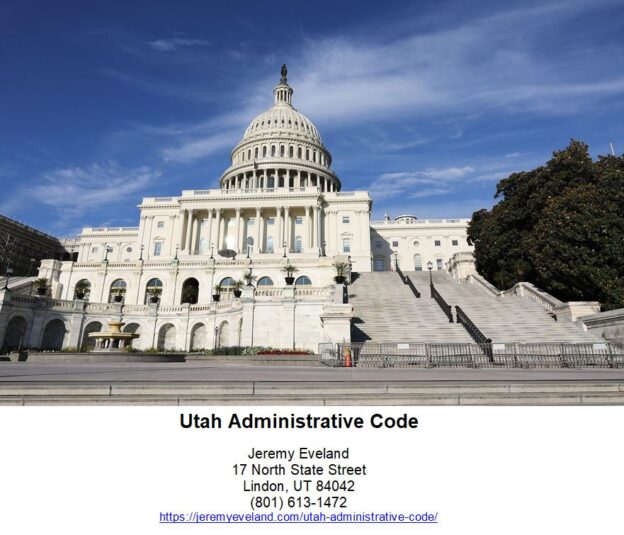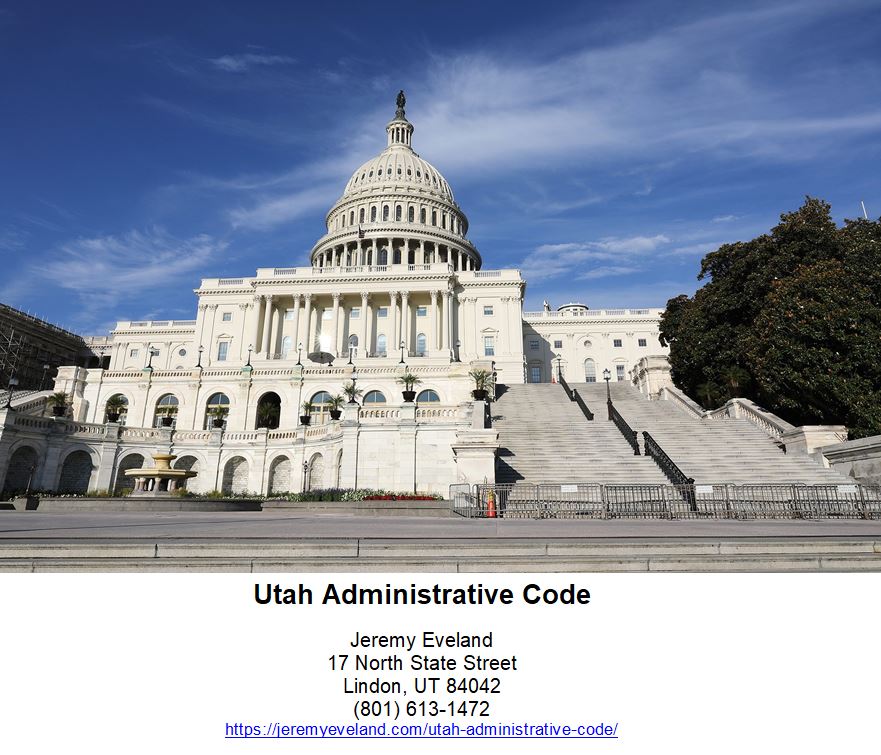-
Attorney at Law
- Introduction
- Exploring the Legal Implications of Utah Code 34-56-101
- How Utah Code 34-56-101 Impacts Businesses in the State
- Understanding the Impact of Utah Code 34-56-101 on Property Owners
- Examining the Effects of Utah Code 34-56-101 on Taxpayers
- Analyzing the Impact of Utah Code 34-56-101 on Local Governments
- Q&A
“Unlock the Laws of Utah with Code 34-56-101!”
Introduction
Utah Code 34-56-101 is a section of the Utah Code that outlines the state’s laws regarding the practice of pharmacy. This code section provides definitions of terms related to the practice of pharmacy, outlines the requirements for licensure, and sets forth the duties and responsibilities of pharmacists. It also outlines the requirements for the sale and distribution of drugs, as well as the penalties for violations of the code. This code section is important for pharmacists, pharmacy technicians, and other healthcare professionals to understand in order to ensure that they are in compliance with the law.
Exploring the Legal Implications of Utah Code 34-56-101
Utah Code 34-56-101 outlines the legal implications of the Utah Uniform Trade Secrets Act. This act provides a legal framework for protecting trade secrets, which are defined as information that is not generally known or readily ascertainable by proper means and that provides a business with a competitive advantage.
Under the act, trade secrets are protected from misappropriation, which is defined as the acquisition, disclosure, or use of a trade secret without the consent of the owner. The act also provides for civil remedies for misappropriation, including injunctive relief, damages, and attorneys’ fees.
The act also provides for criminal penalties for misappropriation. A person who misappropriates a trade secret is guilty of a third-degree felony, punishable by up to five years in prison and a fine of up to $5,000.
The act also provides for a private right of action for trade secret misappropriation. A person who has suffered damages as a result of misappropriation may bring a civil action against the person who misappropriated the trade secret. The court may award damages, injunctive relief, and attorneys’ fees.
Finally, the act provides for a defense to trade secret misappropriation. A person who has acquired a trade secret through independent development or reverse engineering is not liable for misappropriation.
In summary, Utah Code 34-56-101 provides a legal framework for protecting trade secrets from misappropriation. The act provides for civil and criminal penalties for misappropriation, as well as a private right of action and a defense to misappropriation.
The code reads as follows:
“Effective 5/4/2022
34-56-101. Definitions.
As used in this chapter:
(1)
(a) “Adverse action” means:
(i) an action that results in:
(A) the refusal to hire a potential employee; or
(B) the termination of employment, demotion, or reduction of wages of an employee; or
(ii) a governmental entity separating an employee from another employee solely because of the COVID-19 vaccination status of the employee.
(b) “Adverse action” does not include an employer’s reassignment of an employee, if the employee’s COVID-19 vaccination status is not the only reason for the reassignment.
(2) “COVID-19 vaccine” means a substance that is:
(a)
(i) approved for use by the United States Food and Drug Administration; or
(ii) authorized for use by the United States Food and Drug Administration under an emergency use authorization under 21 U.S.C. Sec. 360bbb-3;
(b) injected into or otherwise administered to an individual; and
(c) intended to immunize an individual against COVID-19 as defined in Section 78B-4-517.
(3) “COVID-19 vaccination status” means the state of whether an individual has received a COVID-19 vaccine.
(4) “Employee” means an individual suffered or permitted to work by an employer.
(5)
(a) Except as provided in Subsection (5)(c), “employer” means the same as that term is defined in Section 34A-6-103.
(b) Except as provided in Subsection (5)(c), “employer” includes a federal contractor.
(c) “Employer” does not include:
(i) a person that is subject to a regulation by the Centers for Medicare and Medicaid Services regarding a COVID-19 vaccine, during the period that the regulation is in effect; or
(ii) a health care provider, as defined in Section 78B-3-403, that is a participating provider for the Centers for Medicare and Medicaid Services.
(6) “Governmental entity” means:
(a) an executive branch agency as defined in Section 63A-16-102;
(b) the legislative branch;
(c) the judicial branch;
(d) the State Board of Education;
(e) the Utah Board of Higher Education;
(f) an institution of higher education; and
(g) a political subdivision of the state:
(i) as defined in Section 17B-1-102; and
(ii) including a school district.
(7) “Nurse practitioner” means an individual who is licensed to practice as an advanced practice registered nurse under Title 58, Chapter 31b, Nurse Practice Act.
(8) “Physician” means an individual licensed to practice as a physician or osteopath under Title 58, Chapter 67, Utah Medical Practice Act, or Title 58, Chapter 68, Utah Osteopathic Medical Practice Act.
(9) “Physician assistant” means an individual who is licensed to practice as a physician assistant under Title 58, Chapter 70a, Utah Physician Assistant Act.
(10) “Primary care provider” means a nurse practitioner, physician, or physician assistant.
(11) “Workplace” means the same as that term is defined in Section 34A-6-103.”
How Utah Code 34-56-101 Impacts Businesses in the State
Utah Code 34-56-101 is a law that impacts businesses in the state of Utah. This law outlines the requirements for the formation of a business entity in the state. It states that any business entity formed in the state must register with the Utah Division of Corporations and Commercial Code. This law also outlines the requirements for filing the necessary documents with the Division of Corporations and Commercial Code.
The purpose of this law is to ensure that businesses in the state are properly registered and in compliance with all applicable laws and regulations. This law helps to protect businesses from potential legal issues that may arise from not properly registering their business. It also helps to ensure that businesses are properly taxed and that they are in compliance with all applicable laws and regulations.
By complying with this law, businesses in the state of Utah can ensure that they are operating legally and in compliance with all applicable laws and regulations. This law also helps to protect businesses from potential legal issues that may arise from not properly registering their business. Additionally, this law helps to ensure that businesses are properly taxed and that they are in compliance with all applicable laws and regulations. Compliance with this law is essential for businesses in the state of Utah to ensure that they are operating legally and in compliance with all applicable laws and regulations.
Understanding the Impact of Utah Code 34-56-101 on Property Owners
Utah Code 34-56-101 is a law that affects property owners in the state of Utah. This code outlines the rights and responsibilities of landlords and tenants in the state. It is important for property owners to understand the implications of this code in order to ensure that their rights are protected and that they are in compliance with the law.
Under Utah Code 34-56-101, landlords are required to provide tenants with a written rental agreement that outlines the terms of the lease. This agreement must include the amount of rent, the length of the lease, and any other terms that the landlord and tenant have agreed upon. The agreement must also include a clause that states that the tenant is responsible for any damages to the property caused by their negligence or misuse.
The code also outlines the rights of tenants. Tenants have the right to a safe and habitable living space, and landlords are required to make any necessary repairs in a timely manner. Tenants also have the right to privacy and quiet enjoyment of their rental unit. Landlords are not allowed to enter the rental unit without the tenant’s permission, except in cases of emergency.
Finally, Utah Code 34-56-101 outlines the rights of landlords. Landlords have the right to collect rent on time and to evict tenants who fail to pay rent or violate the terms of the lease. Landlords also have the right to set reasonable rules and regulations for tenants to follow.
Understanding the implications of Utah Code 34-56-101 is essential for property owners in the state of Utah. This code outlines the rights and responsibilities of both landlords and tenants, and it is important for property owners to be aware of these rights and responsibilities in order to ensure that their rights are protected and that they are in compliance with the law.
Examining the Effects of Utah Code 34-56-101 on Taxpayers
The Utah Code 34-56-101 is a law that affects taxpayers in the state of Utah. This code outlines the requirements for filing a state income tax return and the associated tax rates. It also provides information on deductions, credits, and other tax-related matters.
Under this code, all individuals who are required to file a federal income tax return must also file a Utah state income tax return. The filing requirements are based on the individual’s filing status, income, and other factors. The tax rate for individuals is based on their taxable income and ranges from 4.95% to 5.95%.
The code also outlines the deductions and credits that are available to taxpayers. These include deductions for charitable contributions, medical expenses, and other items. Additionally, there are credits available for certain types of income, such as earned income and child care expenses.
The code also provides information on the filing of estimated taxes and the payment of taxes due. It outlines the penalties for failing to file a return or pay taxes on time. Additionally, it provides information on the appeals process for taxpayers who disagree with the assessment of their taxes.
Overall, the Utah Code 34-56-101 provides important information for taxpayers in the state of Utah. It outlines the filing requirements, tax rates, deductions, credits, and other tax-related matters. By understanding this code, taxpayers can ensure that they are in compliance with the law and can take advantage of the deductions and credits available to them.
Analyzing the Impact of Utah Code 34-56-101 on Local Governments
Utah Code 34-56-101 is a law that has a significant impact on local governments in the state of Utah. This code outlines the powers and duties of local governments, and it is important for local governments to understand and comply with the provisions of this code.
The code states that local governments have the power to exercise all powers necessary to carry out their duties and responsibilities. This includes the power to levy taxes, issue bonds, and borrow money. It also grants local governments the authority to adopt ordinances, regulations, and resolutions, and to establish and enforce penalties for violations of those ordinances, regulations, and resolutions.
The code also outlines the duties of local governments. These include providing for the health, safety, and welfare of the citizens, providing for public services, and providing for the protection of public property. Additionally, local governments are responsible for providing for the orderly development of the community and for the protection of the environment.
Finally, the code outlines the procedures for local governments to follow when making decisions. This includes providing for public hearings and providing for public notice of proposed actions. It also requires local governments to provide for the opportunity for citizens to participate in the decision-making process.
In summary, Utah Code 34-56-101 is an important law that outlines the powers and duties of local governments in the state of Utah. It is important for local governments to understand and comply with the provisions of this code in order to ensure that they are properly carrying out their responsibilities and providing for the health, safety, and welfare of their citizens.
Q&A
Q1: What is Utah Code 34-56-101?
A1: Utah Code 34-56-101 is the Utah Uniform Trade Secrets Act, which provides protection for trade secrets in the state of Utah.
Q2: What types of information are protected under Utah Code 34-56-101?
A2: Utah Code 34-56-101 protects information that is not generally known or readily ascertainable, has economic value, and is the subject of reasonable efforts to maintain its secrecy.
Q3: What are the penalties for violating Utah Code 34-56-101?
A3: Violations of Utah Code 34-56-101 can result in civil penalties, including damages, injunctive relief, and attorneys’ fees.
Q4: What is the statute of limitations for filing a claim under Utah Code 34-56-101?
A4: The statute of limitations for filing a claim under Utah Code 34-56-101 is three years from the date of the misappropriation.
Q5: Does Utah Code 34-56-101 apply to all businesses in the state?
A5: Yes, Utah Code 34-56-101 applies to all businesses in the state of Utah.
Areas We Serve
We serve individuals and businesses in the following locations:
Salt Lake City Utah
West Valley City Utah
Provo Utah
West Jordan Utah
Orem Utah
Sandy Utah
Ogden Utah
St. George Utah
Layton Utah
South Jordan Utah
Lehi Utah
Millcreek Utah
Taylorsville Utah
Logan Utah
Murray Utah
Draper Utah
Bountiful Utah
Riverton Utah
Herriman Utah
Spanish Fork Utah
Roy Utah
Pleasant Grove Utah
Kearns Utah
Tooele Utah
Cottonwood Heights Utah
Midvale Utah
Springville Utah
Eagle Mountain Utah
Cedar City Utah
Kaysville Utah
Clearfield Utah
Holladay Utah
American Fork Utah
Syracuse Utah
Saratoga Springs Utah
Magna Utah
Washington Utah
South Salt Lake Utah
Farmington Utah
Clinton Utah
North Salt Lake Utah
Payson Utah
North Ogden Utah
Brigham City Utah
Highland Utah
Centerville Utah
Hurricane Utah
South Ogden Utah
Heber Utah
West Haven Utah
Bluffdale Utah
Santaquin Utah
Smithfield Utah
Woods Cross Utah
Grantsville Utah
Lindon Utah
North Logan Utah
West Point Utah
Vernal Utah
Alpine Utah
Cedar Hills Utah
Pleasant View Utah
Mapleton Utah
Stansbury Par Utah
Washington Terrace Utah
Riverdale Utah
Hooper Utah
Tremonton Utah
Ivins Utah
Park City Utah
Price Utah
Hyrum Utah
Summit Park Utah
Salem Utah
Richfield Utah
Santa Clara Utah
Providence Utah
South Weber Utah
Vineyard Utah
Ephraim Utah
Roosevelt Utah
Farr West Utah
Plain City Utah
Nibley Utah
Enoch Utah
Harrisville Utah
Snyderville Utah
Fruit Heights Utah
Nephi Utah
White City Utah
West Bountiful Utah
Sunset Utah
Moab Utah
Midway Utah
Perry Utah
Kanab Utah
Hyde Park Utah
Silver Summit Utah
La Verkin Utah
Morgan Utah
Utah Code 34-56-101 Consultation
When you need help with Utah Code 34-56-101 call Jeremy D. Eveland, MBA, JD (801) 613-1472 for a consultation.
Jeremy Eveland
17 North State Street
Lindon UT 84042
(801) 613-1472
Related Posts
Estate Planning Lawyer Orem Utah
Legal Requirements To Form A Trust
Charitable Estate Planning Trusts
Estate Planning Lawyer Sandy Utah
Using Disclaimers In Estate Planning
Business Succession Lawyer Spanish Fork Utah



